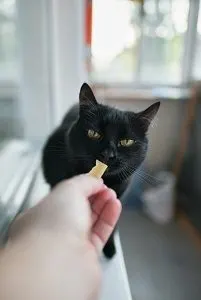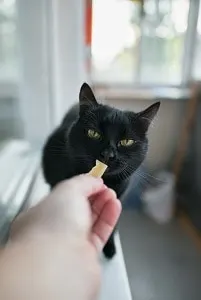 Cat owners bond with their pets through playing, petting, and cuddling together. Many cat parents also like to show their love by sharing a few of their meals with their furry buddies, especially if they’re begging for cheese! We’re here to talk about what happens if your cat shows interest in that Brie or Camembert you’re about to indulge in. Can cats eat cheese?
Cat owners bond with their pets through playing, petting, and cuddling together. Many cat parents also like to show their love by sharing a few of their meals with their furry buddies, especially if they’re begging for cheese! We’re here to talk about what happens if your cat shows interest in that Brie or Camembert you’re about to indulge in. Can cats eat cheese?
Cats can eat cheese in moderation. Cheese in large amounts is not healthy for cats and can cause severe health issues. It is not advisable to routinely feed your cat cheese or any other dairy products.
You might be swayed by your cat’s convincing rendition of “Feed Me the Cheese,” but it is really in your pet’s best interest for you to stick with foods that occur naturally in her diet.
Is It Ok To Feed A Cat Cheese
As we mentioned above, it’s not the best idea to give your cat cheese regularly. Although animals can instinctively discern between plants or animals that are part of their diets versus those that aren’t, it doesn’t always stop them from indulging in their versions of junk food.
Cheese is rich in fat and protein, making it appealing to your feline’s taste buds. The problem is, cats lack the lactase enzyme that humans produce, which would enable them to digest dairy products.
All cats, therefore, are some version of lactose intolerant. Cow’s milk is not something the carnivores would come across in their natural habitats.
An occasional cheesy taste (smaller than a dice) should be fine, as long as your cat does not have a dairy allergy (more about that later). Some pet owners like to save cheese-treat opportunities for administering medication by hiding it inside a piece of cheese.
What Happens If Cats Eat Cheese
A cat’s reaction to eating cheese can range from mild to severe. A healthy cat without a history of a dairy allergy might suffer from diarrhea, constipation, inflammation, and/or vomiting.
Cats with a dairy allergy can exhibit any of the symptoms above and may also develop red patches on the skin or hair loss. Bring your cat to the vet immediately if you notice any signs of deteriorating health.
Since cheese contains so much fat, there’s also a risk of weight gain. Obesity is frequently seen in house pets, especially indoor cats, and can negatively affect your cat’s quality of life and lifespan.
Can Cheese Kill Cats
Cheese can kill cats, but It’s unlikely that a cat will die from eating cheese. Repeated ingestion over a long period of time can cause severe damage to your pet’s digestive system.
Prolonged diarrhea, vomiting, or any abnormality in a cat’s digestive process prevents him from adequately absorbing the necessary nutrients in his food. It can also cause dehydration, resulting in the need for more aggressive treatment or hospitalization.
Just because a crumb of cheese most likely won’t kill your cat, it’s a better idea to find ways to spoil your cat that are more compatible with a healthy kitty lifestyle. Look for meat-based treats geared specifically toward cats to indulge your pet, or shower them with calorie-free pets and cuddles!
Does Cheese Make Cats Constipated
Constipation can indeed be a sign that cheese doesn’t agree with your cat. Every cat is different, and while some pet owners might find that their cat becomes constipated, others will notice the opposite effect.
Signs your cat is constipated include straining when using the litter box, infrequent or hard bowel movements, crying during bathroom time, and even vomiting. Difficulty in going number two over the course of several days is a cause for concern and warrants a trip to the vet.
Does Cheese Make Cats Hyper
Cheese does not appear to cause hyperactivity in cats. Owners report that, if anything, the high-fat food causes some cats to become lethargic.
As your cat’s best friend, you have probably become familiar with your cat’s baseline disposition and personality. Some cats are inherently more excitable, while others are the quintessential snoozing balls of fur.
If your ordinarily calm kitty begins showing sudden changes in energy level, do your best to get to the bottom of it. She may have eaten something that didn’t agree with her or have an underlying problem with her thyroid. Hyperthyroidism can cause an increase in energy and appetite and a decrease in sleep.
Can Cats Eat Cheddar Cheese
One of the most common household cheeses is the popular cheddar cheese. Compared to other types of cheese, it is relatively hard and lower in lactose levels.
Though it might not pose as significant a threat to your cat’s health as some other varieties, don’t get carried away in slipping your furry friend too many bites. Hard cheeses might be lower in lactose but can contain higher amounts of sodium or sugar.
Can Cats Eat Mozzarella Cheese
Softer cheeses like mozzarella, cream cheese, and cottage cheese should be avoided for their higher lactose levels. As mentioned before, cats lack the enzymes necessary to properly digest the lactose found in cheeses and other dairy products.
What Other Foods Should I Avoid Giving My Cat
Cheese and dairy products are not the only type of food that can be harmful to your fussy feline. You might be tempted to offer your cat a taste of other food products you have handy around your house, but before you do, check to make sure it’s compatible with your cat’s diet.
Here are some examples of other foods that can be harmful to your cat:
● Chocolate. Since this decadent snack is often reserved as a treat for humans, you might have the desire to let your pet in on the experience. Please don’t do it! Chocolate contains theobromine and caffeine, which are two ingredients that are both toxic for cats. This applies whether it’s milk or dark chocolate.
● Raw eggs or other proteins. Indeed, predatory animals wouldn’t have access to cooked food in the wild, but don’t assume that raw foods are automatically good for your cat. Raw meat, fish, and eggs can contain the bacteria E. coli and salmonella, causing vomiting, diarrhea, and even death.
● Tuna. Wasn’t tuna made for cats? While cleaning out the bits left in the can is a safe enough treat for your cat to enjoy, too much too often can cause nutrient deficiency or mercury poisoning. And remember, raw fish is a no-no.
● Dog food. If you have various pets at home, you probably keep your pantry well-stocked with each pet’s type of food. You might be tempted to substitute dog food for your cat’s food if you happen to run out, figuring the ingredients are pretty much the same. They’re not! Cat food is specifically formulated to meet a cat’s diet needs, which differ from dogs. Cats require more protein, taurine, vitamin A, and arachidonic acid, helping with kidney and liver function.
● Raw bread dough and yeast. A small amount of prepared bread probably won’t hurt your cat. Yeast and raw dough, however, can pose severe threats to your cat’s health. Just as you can watch your dough expand as it rises in your mixing bowl, it will continue to rise in a cat’s stomach, causing it to become distended and sometimes requiring surgery to remove the mass. The alcohol content resulting from the yeast fermentation can also be extremely dangerous.
The underlying theme of all these different food products is that, in most cases, a small amount ingested occasionally should not cause your cat any real harm. As a responsible cat owner, you should make it a priority to monitor your pet’s eating habits and take precautions against accidental poisoning. Don’t leave any leftovers lying around that you don’t want to be inspected by a very interested feline, especially cheese!

My name is James, and welcome to FAQCats!
Along with our team of cat owners, expert pet enthusiasts, and pet professionals, we aim to write engaging helpful, engaging content about cats. At FAQCats we strive to provide content that’s accurate and fun to read. Our team writes about everything related to cats; even the most complex of topics. Through extensive research and caring for our own fur-pals, we’re able to provide something cat owners worldwide will love. Have a look around, and leave us feedback anytime!

